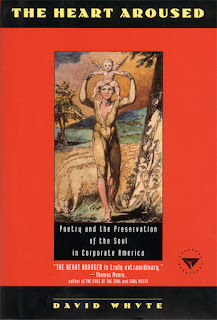Power Through Experience...
“a veritable San Andreas Fault in the American psyche: the personality’s wish to have power over experience, to control all events and consequences, and the soul’s wish to have power through experience, no matter what that may be.”
Whyte, David. The Heart Aroused: Poetry and the Preservation of the Soul in Corporate America. New York: Doubleday, 1994. 1-30.
"What would our days be like if we came out of hiding and brought our fears, loves, and dreams directly into the workplace?
In The Heart Aroused, poet David Whyte shows that the best way to respond to the current call for creativity in organizational life is to overcome our habitual fear and reticence and bring our full passionate, creative human souls, with all their urgencies and unnamed longings, right inside the office with us. When Whyte, who often consults for corporate clients, walks into an organization, it is not just to advise, strategize, and make recommendations. Instead, he clarifies our personal--not organizational--difficulties at work by placing them in the age-old context of poetry and story. To follow Whyte through his brilliant, soulful discussion is to raft the turbulent stream of conflicting currents that make up our lives in American organizations.
Whyte uses poetry to bring to life the experience of change itself. When he retells the story of Beowulf, he shows us how to face the nightmares that intrude into even the most organized workplace, nightmares we face in the demands, conversations, and relationships that make up our work life. He shows how to say what we mean and stand by it, even in the face of hostile authority--based on how poets William Blake, Rainer Maria Rilke, and T. S. Eliot lived their beliefs--in the simplest of words. He reveals how power must be built on vulnerability, how innocence cannot be sacrificed to experience, how creativity is the art of wedding simplicity and clarity with chaos.
Now available in paperback with an all new user's guide, The Heart Aroused shows how to use the language of prophecy, poetry, and enlightenment to give voice and strength to our most creative but most hidden desires.
Born in England, David Whyte is one of the few poets to have taken his perspectives on creativity into the field of organizational development, where he works with many American and international companies. He has published several audio collections and three books of poetry.
SOUL
But what is soul, and what is meant by the preservation of the soul? By definition, soul evades the cage of definition. It is the indefinable essence of a person's spirit and being. It can never be touched and yet the merest hint of its absence causes immediate distress. In a work situation, its lack can be sensed intuitively, though a person may, at the same moment, be powerless to know what has caused the loss. It may be the transfer of a well-loved colleague to another department, a change of rooms to a less appealing office, or, more seriously, the inner intuitions of a path not taken. Though the Oxford English Dictionary's lofty attempt at soul is the principle of life in man or animals, depth-psychologist James Hillman describes it in far more eloquent terms in his provocative book of selected writings, A Blue Fire:
To understand soul we cannot turn to science for a description. Its meaning is best given by its context...words long associated with the soul amplify it further: mind, spirit, heart, life, warmth, humanness, personality, individuality, intentionality, essence, innermost purpose, emotion, quality, virtue, morality, sin, wisdom, death, God. A soul is said to be "troubled," "old," "disembodied," "immortal," "lost," "innocent," "inspired." Eyes are said to be "soulless" by showing no mercy. The soul has been imaged as...given by God and thus divine, as conscience, as a multiplicity and as a unity in diversity, as a harmony, as a fluid, as fire, as dynamic energy, and so on...the search for the soul leads always into the "depths."
The above quote is very revealing and explains a lot about the 'Why are we here?' question. It is easy to see the truth of this quote in all aspects of life, modern or ancient. This, again, outlines the prodigal purpose of life. Read our earlier post on
The Prodigal Son
Our personality/intellect/thinking-mind loves the idea of controlling everything but the overriding and overpowering desire of the soul always seems to get its way. We may think we want something but the soul wants the greater power, through experience, that may have nothing to do with what we think. Ever notice that in your life?



No comments:
Post a Comment